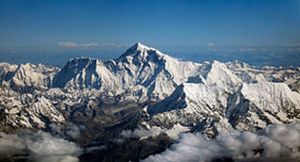Historically, the Muslim rulers of Jerusalem were able to enforce a ban on non-Muslim structures higher than Al Aqsa, but did not always choose to do so.
 Mecca, April 23 – Islamic authorities expressed outrage today that any structure would be made higher than one of Islam’s holiest sites, and demanded that the government of Nepal immediately lower or shorten Mount Everest so that its summit no longer looks more ascendant that the mosque at Al-Aqsa in Jerusalem.
Mecca, April 23 – Islamic authorities expressed outrage today that any structure would be made higher than one of Islam’s holiest sites, and demanded that the government of Nepal immediately lower or shorten Mount Everest so that its summit no longer looks more ascendant that the mosque at Al-Aqsa in Jerusalem.
The Supreme Muslim Council, which represents Sunni Islam, sent a sharply worded letter to the Kathmandu government of President Ram Baran Yadav, in whose territory Everest’s pinnacle rises to 8,848 meters above sea level. By contrast, Al Aqsa sits atop a mountain merely 740 meters above sea level, with the building’s minaret adding only 37 more meters. Given Islamic rules that no structure may rise above that of a mosque, the Council wrote to Yadav protesting such a flagrant expression of disrespect for Islam.
“On behalf of all Muslims, we are incensed that your country maintains a formation, known to Westerners as ‘Everest’ and to locals as Sagarmāthā, that arrogantly towers over our holy site. The construction or maintenance of any such object, of either a religious or mundane nature, constitutes a brazen violation of Islamic law,” the letter read, in part. “A country such as yours, which purports to tolerate diversity in religious beliefs and practices, cannot thus continue to shamelessly and blatantly show such contempt for Islam.”
Nepal’s population is overwhelmingly Buddhist and Hindu, with the two belief systems melding into one for many. Other faiths include Islam, Christianity, Kiratism, and animism, with adherents of Islam representing just over four percent of Nepalese. In its letter, the Council accused Nepal of oppressing those Muslims by forcing their holy site to remain shorter than Everest, and of engaging in hate crimes by making the mountain’s height – it is the tallest in the world – such a prominent part of the country’s image in the international arena.
Officially, the border with the People’s Republic of China runs across Mount Everest at the summit, but the Council decided against sending the same letter to Beijing, fearing it would stoke already inflamed religious and ethnic tensions in China, where Muslim Uighurs of Xinjiang Province are struggling for religious and civil autonomy. That fact was treated explicitly in the missive to Kathamandu, which also read, “Unlike you, we harbor concern for our brethren, and are pointedly not sending this letter to the other party that controls Everest, in the interest of tolerance and reduced ethnic strains.”
Historically, the Muslim rulers of Jerusalem were able to enforce a ban on non-Muslim structures higher than Al Aqsa, but did not always choose to do so. Tensions over the height of the Church of the Holy Sepulchre, which marks the site of Jesus’s crucifixion, have flared over the centuries. Similarly, Israel’s reconstruction of synagogues destroyed by Jordanian soldiers in 1948, after the latter had expelled all Jews from the Old City, has sparked anger from the Muslim Waqf that administers the Al Aqsa compound over such an affront.




